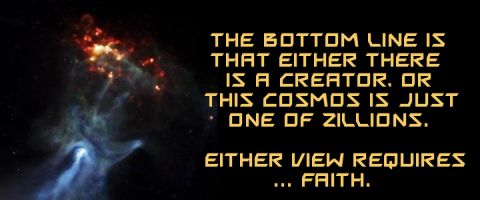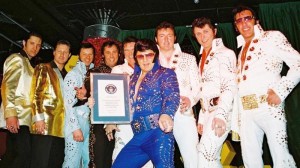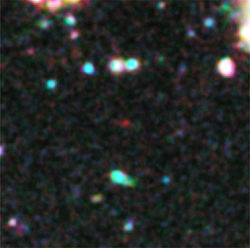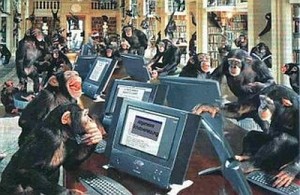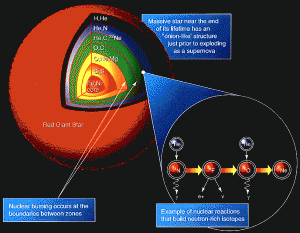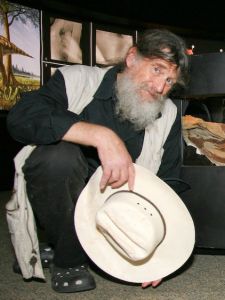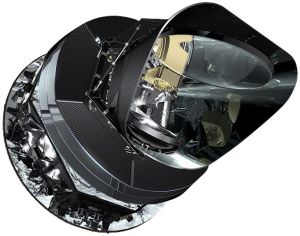![]()
![]()
Where This Came From
This e-tome depends on too many sources to credit properly. I’ve tried to fill it with links to additional info whenever possible. I also want to recommend some books that helped inform my thinking.
(“Ewww, books?” Yep. And Geek Tomes at that. But fear not! All are available as e-books and they really are quite readable.)
From a distinctly Christian perspective, Dr. Hugh Ross of Reasons To Believe has written an enjoyable book called The Creator And The Cosmos. I read the first edition many years ago; it has since been overhauled and expanded into a new edition, which now resides on my Nook. Among other things, Dr. Ross is a big proponent of the idea that Genesis is an eyewitness account.
Next, Dr. Paul Davies of Arizona State University has written several great books about the Cosmos. I relied on him heavily for a neutral, non-Theistic point of view. His classic The Mind Of God and the more recent Cosmic Jackpot were key sources for this.
Another non-theistic point of view comes from Dr. John Gribbin of the University of Sussex and his recent book, Alone In The Universe: Why Our Planet Is Unique. Yes, it’s another look at the Rare Earth hypothesis — the idea that our Earth and Solar System are unique. But whether you agree with that, it’s an excellent, step-by-step walk-through on how our solar system formed.
I guess I could have joined that happy few, that Band of Brothers
known as “Elvii” (like the Illuminati, but with big hair and hip
wigglin’). I chose instead to write this. (You can thank me later.)
![]()
Why This E-Tome Exists
A philosopher might ask, does this really exist? Whether it does or not is irrelevant to me; since you will eventually read it, and thus, by the reading, give the reality to it (a little taste of the subjective Copenhagen Interpretation for you there), I shall continue to write.
(Should you cease to exist while reading, take two aspirin and try again in the morning.)
This e-tome has burst into existence, much like the cosmos itself (only a wee bit smaller) because, like most people in the origins debate, I felt like I had something to say. Even more frightening: I possessed the hubris (nay, arrogance) to believe that I, in spite of my Laycreature and Non-Scientist status, could translate this for the Common Guy or Gal, who might have tried to Google some of this.
For example, a Web search on “fine-tuned universe” will give you a zillion pages filled with either (a) polemics and snarky screeds (on both sides) or (b) dry, geeky references filled with Geek Math and Appeals and logic that will make your head explode. I stand apart from that, like a Beacon Of Clarity Amongst The Fog.
(That’d be a great name for a Shinedown album.)
To my skeptic and atheist readers: Christians are often accused of using emotional, rather than logical, arguments. Don’t worry. I won’t do that here. That’s not fair to you and it’s a waste of time. I will not say, “do you realize that if everything hadn’t worked out just perfectly, this adorable little kitty wouldn’t be here??!?”
“D’aawwww!!“
![]()
We Now Know More
We now have telescopes in space that can see back in time to only a few hundred thousand years after the Big Bang; “microscopes” that can peer into molecules; and supercomputing clusters that can run extremely complex simulations, testing and “what-if’ing” different theories of how All This Happened(tm). The results have been nothing short of astonishing.
You can sing “Mo’ Money, Mo’ Money” and take this to the bank: unless you have kept up with this stuff, what you “knew” just a few years ago is probably out of date now. If you were in school with me back during the dark ages, when giants walked the land and we used clay tablets and chisels instead of iPads, that is especially the case.
For example, Gribbin’s book is based heavily on recent supercomputer simulations of how the Earth formed. I was stunned to learn that the unusually high levels of some radioactives in our system (compared to other star systems) can best be modeled with a nearby supernova, while our solar system was still forming.
But it had to happen during a very narrow window of time, or our baby solar system would have been blown apart, instead … and you and I wouldn’t be here. More on Gribbin’s book later; are you intrigued yet?
(That’s an old broadcasting trick called a “teaser.” Hopefully it will captivate your interest and cause you to keep reading.)
UDFj-39546284, as of this writing, the most distant object ever imaged.
(The tiny red dot in the center). It’s over 13 billion light years from
Earth, meaning that it formed not long after the Big Bang itself.
![]()
What I Believe
I am a conservative, Bible-believing Christian who adheres to all of the key tenets of our faith. In particular, I believe that
- Adam and Eve were historical figures, specially created by Almighty God
- Jesus is the Son of God, born of a virgin (yes, atheists, He was His own Father), who died for our sins and then rose from the dead
- the Bible is a divinely-inspired book and is the standard of faith and practice for the Christian.
I also have no trouble reconciling these beliefs with everything that science has concluded about nature in the past 200 years or so. I can accept that the Earth is approximately 4.5 billion years old and exists in a cosmos that recently celebrated its 13.7 billionth birthday.
(Yes, I sent a gift. Stop nagging; it’s not polite.)

What do you get for a Cosmos that has everything?
I believe that a process called “evolution” is responsible for the diversity of life on this planet … and that the Bible is in agreement with all of this. Further, I’m tired of being told by Young Earthers and fundamentalists on the one hand, and radical non-theists on the other, that this can’t be.
Can, too!
(There. I’ve settled the entire argument. You may stop reading now.)
![]()
Why This Matters
Poll after poll shows that a strong majority of Americans believe in some form of Creator or Supreme Being. Worldwide, that figure approaches 95%; it’s somewhat less in Western societies, and from what I’ve seen, seems to be markedly lower in certain regions.
(France, for example. Whaddya expect? Bunch of cheese-eatin’ heathens.)
But overall and on average, there is no question that a strong majority of people believe in a Creator.
You’d never know that from watching television, or from browsing the Internet, though. If you are going to be Cool (or Hip or With It or Whatever The Term Is This Week), you will certainly be uncomfortable with the concept of God … and with Christianity in particular.
A thundering horde of popular figures, from scientists like Richard Dawkins to entertainers like Penn and Teller, actively promote the idea that there is no God and/or that religion is evil. As far as they’re concerned, you are simply clinging to the superstitions of your grandparents.
And everyone knows that grandparents are dangerous.
![]()
We Choose What We Believe
This relative minority has influence all out of proportion to their actual numbers. As a result, there is increasing peer pressure against the public expression of any belief in God nowadays. Those skeptics who consider themselves broadminded are willing to grant that Believers can have their “sky fairies,” but only in private. (And it goes without saying that wehave no business working in science.)
But I’m going to show you here that, based on the current scientific consensus that
- there is as much evidence for the existence of God as for any alternative, and
- if you don’t believe in God, that’s your choice.
Simply put: if you don’t believe in God, you certainly have a right to that opinion. But you do so because you choose to do so, and not because of any evidence that compels that point of view. (The operative terms are “choose” and “compel.”)
If the Bible is right, there is a God. Further, He created all of this — and you — for a reason. He wants to know you personally … and to give purpose and meaning to your life. Jesus is still the answer for the 21st Century. He hasn’t changed.
The monkeys lost interest in Shakespeare.
They swap knock-knock jokes on Twitter.
![]()
For My Fellow Believers
I’m writing for another reason: I want my fellow Believers to understand that we can coexist with a rational, secular view of nature. But we must also accept that science must be kept independent of religion and must be permitted to operate as it does, even if it sometimes engages in research that we might personally find objectionable.
Many Christians don’t understand science and the scientific method. This is unfortunate, because I believe that it helps our point of view as much as it does the opposition’s. (I will cover this first in the very next section, before getting to the design stuff, because it is important.)
The bottom line for us is this: if there is a God who created this cosmos (and we certainly believe this), we have nothing to fear from science — provided it follows the rules fairly and honestly.
I do have a suggestion and I hope you won’t take it the wrong way. Don’t try to memorize what you read here and then seek out an argument with a committed skeptic. Send them to this Website instead, then pray for me.
(Seriously. This is my ministry. I’ve been doing it for decades.)
The Opabinia appeared during the Cambrian Explosion.
(“Opabinia” must be Greek for “excess of eyes and ugly.”)
![]()
And If You Insist …
It’s hard to find some of this information online and in lay-readable form. Most of the really good, readable and in-depth stuff is in copyrighted books. If you tell a skeptic to “read this book,” he’s not likely to do it. He’ll do a Web search for a review written by a fellow skeptic and then dismiss it out of hand. (But we won’t call this “confirmation bias,” because that would annoy them, and we’re all friends here.)
Second, understand the mindset that you’re dealing with. For many decades, skeptics felt that they held the intellectual high ground. Evolution had been accepted as scientific fact and the Genesis account was considered a myth (at best). When Big Bang Cosmology entered the picture, they were caught flatfooted at first. (I speak from experience. I Was There(tm).) Purely out of habit, they brought their existing paradigm to that discussion, all of the usual “Appeals” and arguments.
The evolution of life and the evolution of galaxies and stars are two completely different things. (Dr. Davies devotes a nice chapter to this in Cosmic Jackpot — see? I had to refer to a book!). Biological evolution has feedback mechanisms that force life to adapt, regardless of whether you attribute it to a Creator or to Dawkin’s Blind Watchmaker. (Another book.)
At the gut level, skeptics believe that there must be some equivalent principle at work in the Cosmos at large. Perhaps we just haven’t discovered it yet. Let’s ignore the obvious, that to believe in things that haven’t been observed and/or demonstrated is, by definition, faith. From their point of view, it’s just a matter of time. Christians used the God Of The Gaps against biological evolution, only to have each “gap” closed with new discoveries. Not surprisingly, skeptics feel that the track record is clearly on their side.
You’re going to have a difficult time making the skeptic see that the clear trend in astrophysics is precisely the opposite. (Regardless of what Dr. Victor Stenger says. We’ll discuss him later.) You have been warned.
Dr. Robert Bakker, Paleontologist. The character
of Dr. Burke in The Lost World: Jurassic Park (the
guy who got eaten by a T. Rex) was based on him.
Enhanced coolness: he’s also a pentecostal preacher.
![]()
For My Atheist Friends
There are many amongst your group who honestly, sincerely think that any belief in God “taints” the mind. (I’m looking at you, Richard Dawkins.) A quick Google search showed me hit after hit of skeptic, freethinker and atheistic Websites and forums that proclaimed — nay, trumpeted — that very thing.
(My favorite was the guy who yelled, “if you believe in God rather than science, you might as well unplug your computer!”)
We’ll ignore the fact that some of the greatest scientists in history have been Believers — for example, Allan Sandage, winner of the Craaford Prize, the equivalent of a Nobel in Astronomy. We’ll roll with it for a moment, because I want to make a point. (I’m sure you’re shocked.)
The classic example from Brights is that geologists were once constrained to describe rock layers as “pre-flood” or “post-flood.” Hey, the Bible taught that there was a Flood, so it had to be true, right? “So,” concludes the Atheist ominously, “who knows how badly scientific progress was delayed by religious interference like this?!?”
*Cough* … um, that finger points both ways, my friend. There have also been cases where scientists have ignored the Principle of Economy (“the simplest theory that fits the facts is preferred” — more on that in the next section) and have contrived a more convoluted explanation solely to avoid a theistic conclusion.
This dog doesn’t understand physics.
Activist Atheism Can Thwart Scientific Progress, Too
A few years before Big Bang Cosmology would become the consensus, Christopher Isham said,
- Perhaps the best argument in favor of the thesis that the Big Bang supports theism is the obvious unease with which it is greeted by some atheist physicists. At times this has led to scientific ideas, such as continuous creation [steady state] or an oscillating universe, being advanced with a tenacity [that] exceeds their intrinsic worth …”
The late John Maddox, long-time editor at Nature magazine, is just one example. A committed atheist, that man hated Big Bang Cosmology with a glowing passion. During his tenure, you rarely saw anything favorable to that theory in Nature. So much for scientific objectivity.
Fred Hoyle.
A better example is the late Fred Hoyle, also an outspoken atheist who hated the Big Bang (and said so — in fact, he’s the one who coined the derisive term, “Big Bang;” the name stuck). He hated it for the same reason as Maddox: because it implied a beginning. Because Western theologians were latching onto it. Hoyle hated it so much, he (and some friends) developed the Steady State Theory primarily for that reason. Even after his theory was falsified and abandoned, he and a few other diehards continued to argue for it.
Hoyle was a character and an oddball, but there’s no doubt he was a genius. Now for the big question: how much would science have advanced if he and his fellows had been able to put aside their non-belief and work on improving the Big Bang? You throw geniuses like Hoyle at the problem and we’d likely have had a theory of Cosmic Inflation long before Alan Guth came up with it in the late 1970’s.
Physician, heal thyself. Let’s just agree that all of us need to let science follow the facts where they lead … even if it supports my point of view instead of yours. (Heh.)
It looks like Darth Vader’s barbeque grill, but it’s
actually the Planck satellite. It will make more
measurements of the Cosmic Microwave Background.
![]()
Getting Your Mind Right
There’s a simple, logical procession to the questions that arise in any discussion of origins and a Creator. I won’t precisely follow this sequence here (hey, it’s my Website), but speaking from experience in many discussions online, if you really want to know the truth (or The Truth), you need to do the following, and in this order:
First, determine if there might be a God. Arguing about whether he or she is the Flying Spaghetti Monster or the God of the Bible is pointless until you get that settled.
Second, you can decide what the nature of that God might be. I’ll warn you now what I’m going to show you here: given what we know about this Cosmos, the only snug fit, of all the worlds major religions, is … Jesus.
Finally, we can get around to the philosophical objections to religion in general and Christianity in particular. That humans have done a very poor job of actually following Christ is pretty obvious — and I discuss that at some length later.
But that doesn’t nullify the validity of what Jesus said. Instead of dumping all religion, you ought to get your mind right and work to help make it what Jesus actually intends for it to be! (Heh.)
![]()
And if you still disagree with me after having read this?
I hope that you will at least treat me (or the loved one who sent you here, if that’s the case) with a bit more respect.
My faith in God is not a blind suspension of reason. It isn’t “personal incredulity” or a desperate psychological need for a “God of the Gaps” or any other such nonsense.
Have the courtesy to at least acknowledge that I arrived at my beliefs after a long, thoughtful process.
The end result of decades of study is that I am now more convinced than ever that there is a God and that He loves us.
Use the menu to the left, or click here to proceed to “How Science Works.”

